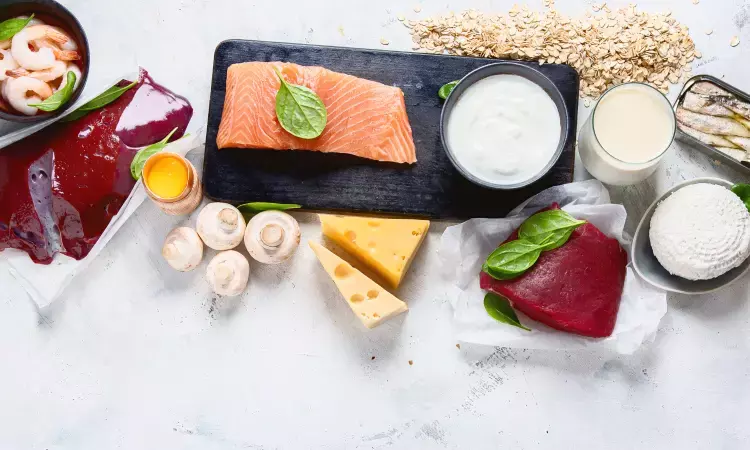- Home
- Medical news & Guidelines
- Anesthesiology
- Cardiology and CTVS
- Critical Care
- Dentistry
- Dermatology
- Diabetes and Endocrinology
- ENT
- Gastroenterology
- Medicine
- Nephrology
- Neurology
- Obstretics-Gynaecology
- Oncology
- Ophthalmology
- Orthopaedics
- Pediatrics-Neonatology
- Psychiatry
- Pulmonology
- Radiology
- Surgery
- Urology
- Laboratory Medicine
- Diet
- Nursing
- Paramedical
- Physiotherapy
- Health news
- Fact Check
- Bone Health Fact Check
- Brain Health Fact Check
- Cancer Related Fact Check
- Child Care Fact Check
- Dental and oral health fact check
- Diabetes and metabolic health fact check
- Diet and Nutrition Fact Check
- Eye and ENT Care Fact Check
- Fitness fact check
- Gut health fact check
- Heart health fact check
- Kidney health fact check
- Medical education fact check
- Men's health fact check
- Respiratory fact check
- Skin and hair care fact check
- Vaccine and Immunization fact check
- Women's health fact check
- AYUSH
- State News
- Andaman and Nicobar Islands
- Andhra Pradesh
- Arunachal Pradesh
- Assam
- Bihar
- Chandigarh
- Chattisgarh
- Dadra and Nagar Haveli
- Daman and Diu
- Delhi
- Goa
- Gujarat
- Haryana
- Himachal Pradesh
- Jammu & Kashmir
- Jharkhand
- Karnataka
- Kerala
- Ladakh
- Lakshadweep
- Madhya Pradesh
- Maharashtra
- Manipur
- Meghalaya
- Mizoram
- Nagaland
- Odisha
- Puducherry
- Punjab
- Rajasthan
- Sikkim
- Tamil Nadu
- Telangana
- Tripura
- Uttar Pradesh
- Uttrakhand
- West Bengal
- Medical Education
- Industry
Vitamin B12 intake from dairy products cuts risk of deficiency and supplementation needs among elderly

Canada: A study published in the Journal of Nutrition has concluded that increased intake of vitamin B-12 from dairy lowers the risk of vitamin B-12 deficiency in healthy older adults.
The researchers mentioned that prevention of low vitamin B-12 status is possible through diet, and it also limits the requirement of taking vitamin supplementation.
It is already known that deficiency of Vitamin B-12 causes irreversible neurologic damage with a prevalence of 5%–15%. This is primarily due to impaired absorption.
There are food sources rich in Vitamin B-12. The higher bioavailability of vitamin B-12 in food sources can prevent the deficiency of vitamin B-12.
The researchers examined the association of intake of vitamin B-12 via food sources and low status of vitamin B-12 and deficiency in older adults using the NuAge Database and Biobank.
The assessment of vitamin B-12 was done using serum and urine.
The study pointers include the following:
- The study had 1753 adults of age 67–84 years.
- These patients were followed up for four years.
- Analytic samples had 1230 to 1463 individuals.
- Using three 24-h dietary recalls, dietary vitamin B-12 intake was assessed annually.
- The assessment of Vitamin B-12 status annually: low serum vitamin B-12 with <221 pmol/L, elevated urinary methylmalonic acid (MMA)/creatinine ratio (>2 μmol/mmol), and a combination of both (deficiency).
- The user's taking Vitamin B-12 supplementation were excluded.
- 21.8%–32.5% of participants had low serum vitamin B-12
- 12.5%–17.0% of participants had elevated urine MMA/creatinine
- 10.1%–12.7% of participants had a deficiency.
- Median (IQR) total vitamin B-12 intake was 3.19 μg/d
- The Main vitamin B-12 sources were “dairy” and “meat, poultry, and organ meats.”
- The ORs in the fifth quintile compared with the first total vitamin B-12 intake were 0.52, 0.63 and 0.38 for low serum vitamin B-12, elevated urine MMA/creatinine and vitamin B-12 deficiency, respectively.
- ORs in the fourth quartile compared with the first dairy-derived vitamin B-12 intake were 0.46, 0.51 and 0.35, respectively.
- There were no associations with vitamin B-12 from “meat, poultry, and organ meats.”
To conclude, a Higher intake of vitamin B-12 from dairy decreases the risk of low vitamin B-12 status and deficiency in older adults.
Food groups are essential in reducing the risk of deficiency in older populations.
The study's strength includes design, large sample size, and repeated measures over four years.
Further reading:
He Helen Huang, Alan A Cohen, Pierrette Gaudreau, Christiane Auray-Blais, David Allard, Michel Boutin, Isabelle Reid, Valérie Turcot, Nancy Presse, Vitamin B-12 Intake from Dairy but Not Meat Is Associated with Decreased Risk of Low Vitamin B-12 Status and Deficiency in Older Adults from Quebec, Canada, The Journal of Nutrition, Volume 152, Issue 11, November 2022, Pages 2483–2492, https://doi.org/10.1093/jn/nxac143
BDS, MDS in Periodontics and Implantology
Dr. Aditi Yadav is a BDS, MDS in Periodontics and Implantology. She has a clinical experience of 5 years as a laser dental surgeon. She also has a Diploma in clinical research and pharmacovigilance and is a Certified data scientist. She is currently working as a content developer in e-health services. Dr. Yadav has a keen interest in Medical Journalism and is actively involved in Medical Research writing.
Dr Kamal Kant Kohli-MBBS, DTCD- a chest specialist with more than 30 years of practice and a flair for writing clinical articles, Dr Kamal Kant Kohli joined Medical Dialogues as a Chief Editor of Medical News. Besides writing articles, as an editor, he proofreads and verifies all the medical content published on Medical Dialogues including those coming from journals, studies,medical conferences,guidelines etc. Email: drkohli@medicaldialogues.in. Contact no. 011-43720751


